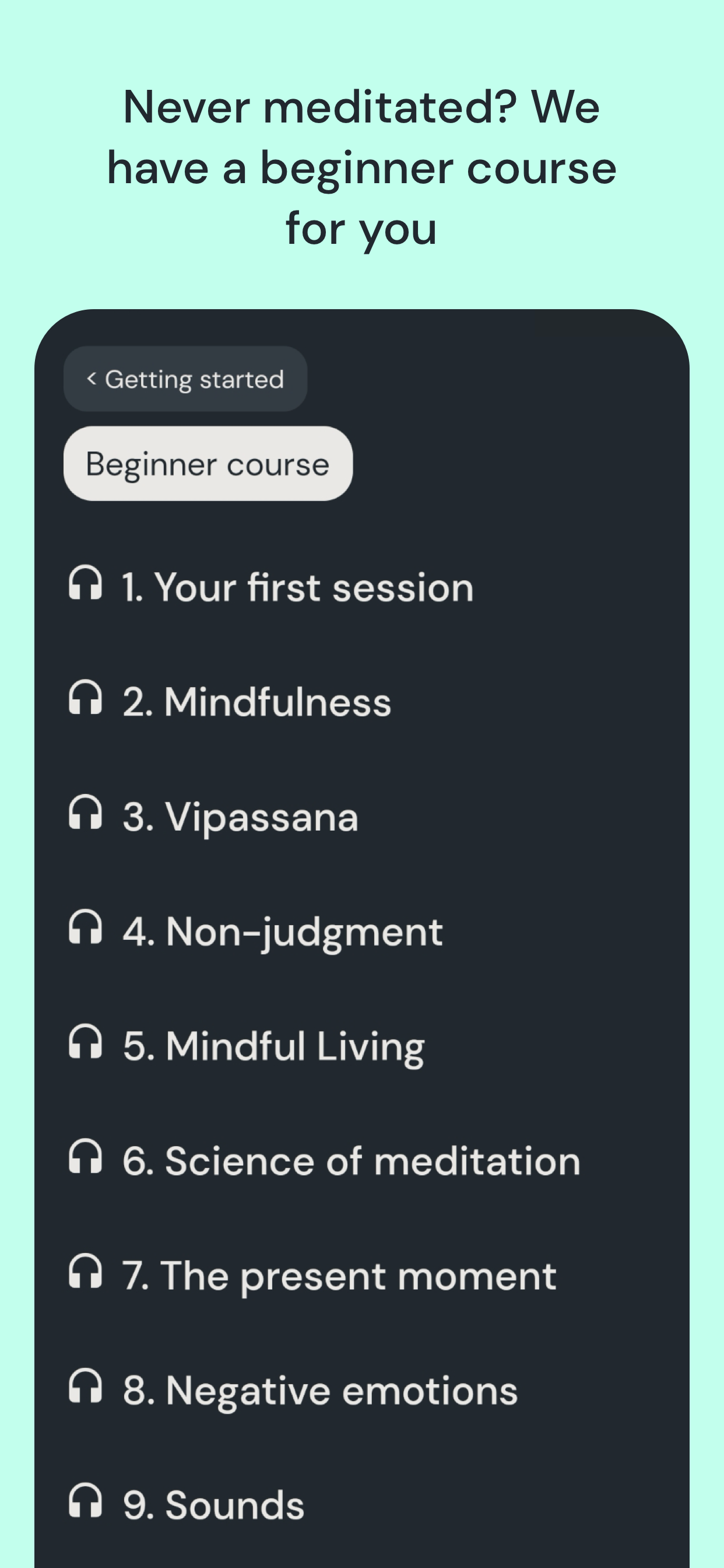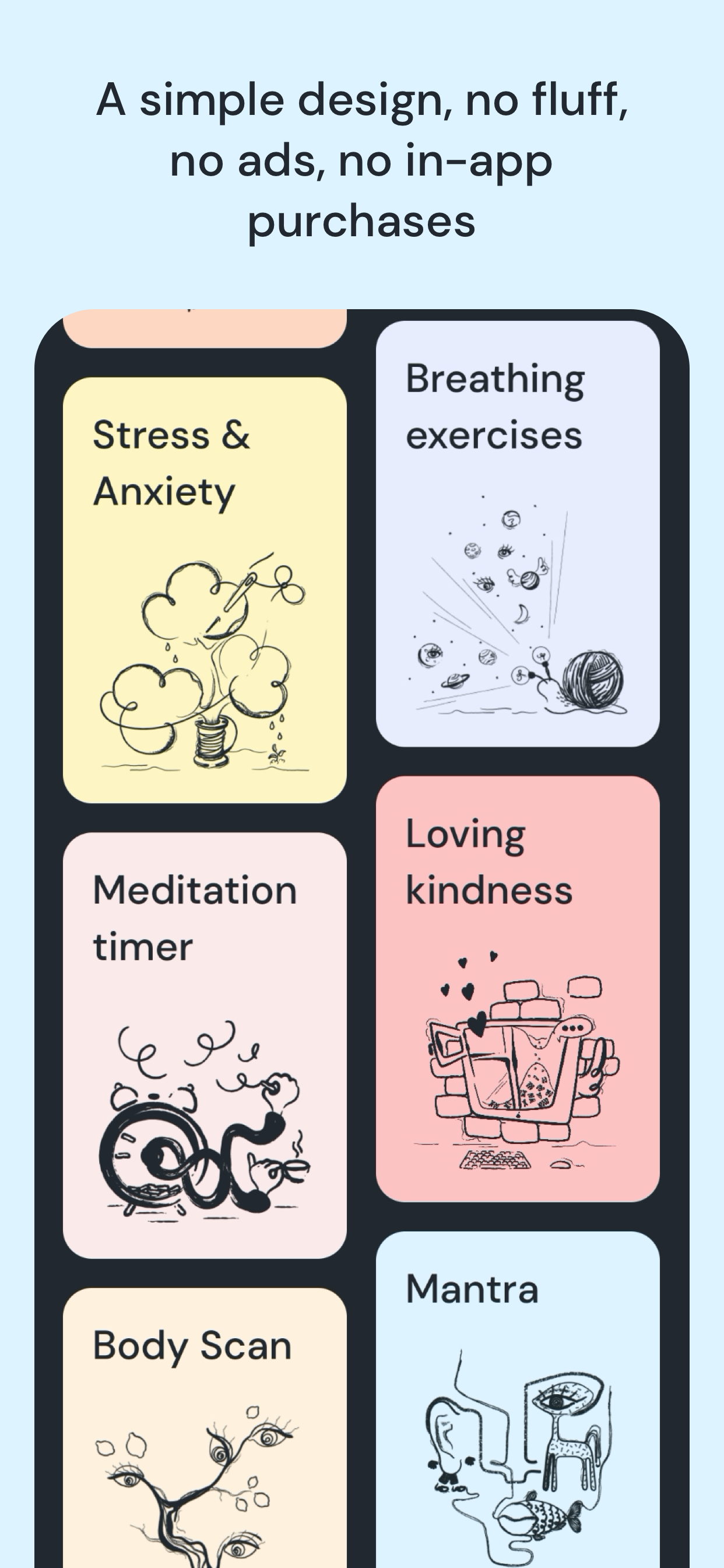Meditation that doesn't break the bank with Medito
Lockdown has changed how we network. Networks and online communities have opened their doors and we’ve been able to connect with people, ideas and businesses we perhaps wouldn’t have normally found.
Steve at Medito was one of those people. It’s no secret that we’re big fans of AndCo at The Doers and in the face of the lockdown, they’ve launched a Slack group which is full of freelancers and self-employed folk and has been a great source of company and inspiration. We’ve also been big advocates of mindfulness for a while now and know how important it is, now more than ever, to take time out. So when we heard about Medito, a free meditation app made for people not profit, we just had to find out more.
“Unfortunately, most of the meditation apps available were not free. We are living in a world where practically everything can be sold and bought. But should mental health be a commodity?”
Hey guys and welcome to The Doers! Start by telling us a little bit about yourself and your background…
Hello! Medito Foundation has four founding board members - Romain Sourdiaux, our UI / UX designer, Mike Speed, our app developer, Gareth Yorke, our project manager and Steven Yorke, our communications manager. Mike, Gareth and Steven grew up together in Caerphilly, South Wales and Mike met Romain, who is originally from the South of France, in Manchester and they now live together in Amsterdam, while Steven lives in Cardiff and Gareth lives in Bristol.
We felt that our collective skills and experience, along with our interest in mindfulness and meditation made us a perfect group to build Medito.
It’s great when friends can come together to work and the timing is just right, how did you come up with the idea?
Romain came up with the idea for Medito. After trying different meditation apps to help improve his own mental health, he understood why they were becoming so popular. It was because mindfulness and meditation can actually help us. They make us slow down, take a step back and view things from a different angle. Practising meditation and mindfulness can help us deal better with depression, anxiety, stress and more.
Unfortunately, most of the meditation apps available were not free. We are living in a world where practically everything can be sold and bought. But should mental health be a commodity? We are talking about mental health here, not a meal at McDonald's or an iPhone from Apple.
Is it really what we want for mental health? That a few make money thanks to people trying to feel better mentally? Should people have to pay for this type of product?
Romain didn’t think so, and it only took one conversation to get the rest of us onboard with building a free app. Made for people, not for profit.
We totally agree, good mental health is so important. Talk us through what Medito offers…
Medito is a completely free mindfulness and meditation app that covers a wide variety of meditation content, it’s also ad-free! We have more to come but it currently includes:
Beginner course
Intermediate course
Daily meditations
Anxiety / stress relief meditations
Body scan meditations
Sleep meditations and music
Mantra meditations
Loving kindness meditations
Breathing exercises
Meditation timers
Quick meditations
Relaxing soundscapes
We believe meditation can positively transform people’s lives, and no one should have to pay for it. There will never be any subscriptions, ads or in-app purchases.
Practising meditation can help reduce anxiety and stress as well as improve attention, sleep and general well-being. Negative states of mind can affect anyone, at any age, in any situation. That's why we make sure our tools are accessible to everyone to help as many people as possible.
Once you had the idea and your team on board, how did you develop and launch the app?
Medito Foundation was registered as a nonprofit in the Netherlands (where Mike and Romain live) and the Medito app has been built 100% by volunteers. We had an amazing response on Reddit, which allowed us to recruit volunteers from around the world. Since we launched the app, under a week ago, we have gained our first ‘Patrons’ on Patreon, meaning that we now have regular monthly donors helping to cover our running costs, such as server costs, development tools and marketing.
Our branding for Medito Foundation has grown naturally from the app design. We have received some branding concepts from a pro-bono designer, which we will use to develop our branding further.
Tell us about the name - where does it come from and what does it mean?
We were unsure about what we would call the app and the foundation for a while. We had discussions in our Telegram group with our volunteers and lots of different names were suggested. We knew we wanted something short, memorable and something that would hint at ‘meditation’.
One of the volunteers suggested ‘Medito’, which is actually the Esperanto word for Meditation. We instantly loved it and the link to Esperanto seemed fitting, as the language was created to be easy, flexible and universal - as we hoped Medito will be, freely available and an open source.
“We had an amazing response that we got from Reddit - first from the initial post explaining the idea and asking if anybody wanted to get involved in the project, and then almost a year later when we launched the app”
What steps of creating and launching Medito has surprised you the most? What parts have you enjoyed and which parts have been difficult?
The most surprising thing was the amazing response that we got from Reddit - first from the initial post explaining the idea and asking if anybody wanted to get involved in the project, and then almost a year later when we launched the app. We had hundreds of positive comments as well people signing up to become volunteers and monthly donors.
The most difficult part has been producing such a huge amount of original content, all of which had to be written, recorded by multiple people (as we want to offer users a choice of different voices), edited and quality checked before being uploaded to the app. Thankfully, we’ve had dedicated volunteers who have made this possible - shout out to Michael Martin from Los Angeles, California and Will Irace from Portland, Oregon.
Why do you think meditation is so important today?
As humans, we're constantly overthinking things, wondering what's going to happen tomorrow, thinking of this, thinking of that. We do it all the time — we're always talking to ourselves in our heads. These thoughts arise spontaneously and automatically. It feels like we are controlling them, but we're not.
When we become aware of this, we can view our thoughts as something that happens to us. When we stop referring to them as though they are us, we find out that there is only the present moment. When you identify with your thoughts too much, you begin to be caught up in them. Eventually they can take over. Meditation isn't about trying to 'clear your mind' or to stop thinking. You're just training yourself to notice that the noise isn't you; it isn't your identity.
Starting a regular habit of meditation will help 'cultivate an awareness of the present' that you will soon begin to notice in your day-to-day life.Meditation can help develop clarity, improve concentration and reduce stress. Practicing meditation will help you observe mental phenomena, and learn the patterns and habits of your mind.
Different scientific studies have shown positive effects related to meditation, such as a greater sense of empathy for others, increase in positive thinking, development of emotional well-being, and reduced anxiety, depression, and pain.
“positive effects related to meditation, such as a greater sense of empathy for others, increase in positive thinking, development of emotional well-being, and reduced anxiety, depression, and pain”
What problems and obstacles around meditation did you discover when creating Medito?
Some people might be put off by meditation, thinking that it’s something that’s difficult or esoteric. However, it’s simply about becoming fully aware in the present moment, often using an object of focus, such as the breath. There is no perfect way or place in which to meditate. Your intention in your meditation is far more important than the physical setting.
Who do you see as your main competitors and why is Medito different?
The biggest players in the Meditation app market are Headspace and Calm. The feedback that we’ve had so far has been that the content on Medito is just as good (if not better) than the content available on Headspace and Calm, but we’re offering it for free. Medito is made for people, not profit.
What are your plans and hopes for the future of Medito...what’s next?
We’re continuing to grow the app, regularly adding new features and content. We aim to be the number one meditation app available and to help countless people to improve their mental health and general wellbeing.
As well as the Medito app, we also have other projects in the works, including a "wikipedia" of meditation and mindfulness.
Give us your top three recommendations - podcasts, books, people to follow, sources of inspiration…
The Mind Illuminated: A Complete Meditation Guide Integrating Buddhist Wisdom and Brain Science for Greater Mindfulness By Culadasa (John Yates PHD) and Matthew Immergut PHD. It’s an accessible book, providing a progressive, step-by-step guide to meditation. For anyone looking for a contemporary and secular meditation manual, this is a must-read.
Alan Watts - Arguably the most influential populariser of eastern philosophy in the past 50 years. Alan Watts’ lectures are freely available on YouTube. We’d recommend his book ‘The Book on the Taboo Against Knowing Who You Are’.
The Miracle Of Mindfulness: The Classic Guide to Meditation By Thich Nhat Hanh. Tich Nhat Nahn is a Zen master, peace activist and Nobel prize nominee. His ‘The Miracle of Mediation’ is a beautifully written guide to finding peace in the present moment through meditation and mindfulness.
To download the Medito app, which is completely free, visit bit.ly/medito-android for Android and bit.ly/medito-iOS for iOS. Find out more about Medito on their website and give them a follow on twitter @meditoHQ.








